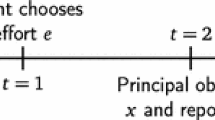Abstract
Consider a government that adopts a program, sees a noisy signal about its success, and decides whether to continue the program. Suppose further that the success of a program is greater if people think it will be continued. This paper considers outcomes when government cannot commit. We find that welfare can be higher when information is poor, that government should at times commit to continuing a program it believes had failed, and that a government which fears losing power may acquire either too much or too little information.
Similar content being viewed by others
References
Alesina, Alberto (1989). Politics and business cycles in industrial democracies. Economic Policy 8: 55–87.
Alesina, Alberto and Tabellini, Guido (1990). A positive theory of fiscal deficits and government debt. Review of Economic Studies 57: 403–414.
Baiman, Stanley and Demski, Joel S. (1980). Economically optimal performance evaluation and control systems. Journal of Accounting Research 18: 184–220.
Baron, David P. and Besanko, David (1984). Regulation, asymmetric information, and auditing. Rand Journal of Economics 15: 447–470.
Barro, Robert and Gordon, David (1983). A positive theory of monetary policy in a natural rate model. Journal of Political Economy 91: 589–610.
Border, Kim C. and Sobel, Joel (1987). Samurai accountant: A theory of auditing and plunder. Review of Economic Studies 54: 525–540.
Cukierman, Alex and Meltzer, Allan H. (1986). A positive theory of discretionary policy, the costs of democratic government, and the benefits of a constitution. Economic Inquiry 24: 367–388.
Gilligan, Thomas W. and Krehbiel, Keith (1990). The organization of informative committees by a rational legislature. American Journal of Political Science 34: 531–564.
Glazer, Amihai (1989). Politics and the choice of durability. American Economic Review 79: 1207–1213.
Harris, Milton and Raviv, Artur (1979). Optimal incentive contracts with imperfect information. Journal of Economic Theory 20: 231–259.
Holmstrom, Bengt (1979). Moral hazard and observability. Bell Journal of Economics Spring 10: 74–91.
Kanodia, Chandra S. (1985). Stochastic monitoring and moral hazard. Journal of Accounting Research 23: 175–193.
Kydland, Finn E. and Prescott, E.C. (1977). Rules rather than discretion: The inconsistency of optimal plans. Journal of Political Economy 85: 473–491.
Laffont, Jean-Jacques and Tirole, Jean (1986). Using cost observations to regulate firms. Journal of Political Economy 94: 614–641.
Lindsay, Cotton M. (1976). A theory of government enterprise. Journal of Political Economy 84(5): 1061–1077.
McCubbins, Mathew, Noll, Roger G. and Weingast, Barry R. (1987). Administrative procedures as instruments of political control. Journal of Law, Economics, and Organization 3: 243–277.
McCubbins, Mathew D., Noll, Roger J. and Weingast, Barry R. (1989). Structure and process, politics, and policy: Administrative arrangements for control of agencies. Virginia Law Review 75(2): 431–482.
O'Keefe, Mary, Viscusi, Kip and Zeckhauser, Richard (1984). Economic contests: Comparative reward schemes. Journal of Labor Economics 2: 27–56.
Persson, Torsten (1988). Credibility of macroeconomic policy: An introduction and a broad survey. European Economic Review 32: 519–532.
Reinganum, Jennifer F. and Wilde, Louis L. (1985). Income tax compliance in a principal-agent framework. Journal of Public Economics 26: 1–18.
Reinganum, Jennifer F. and Wilde, Louis L. (1988). A note on enforcement uncertainty and taxpayer compliance. Quarterly Journal of Economics 103: 793–798.
Shavell, Steven (1979). Risk sharing and incentives in the principal and agent relationship. Bell Journal of Economics 10: 55–73.
Spence, A. Michael and Zeckhauser, Richard (1971). Insurance, information and individual action. American Economic Review 61: 380–387.
Strotz, Robert (1955). Myopia and inconsistency in dynamic utility maximization. Review of Economics Studies 23: 165–180.
Tabellini, Guido and Alesina, Alberto (1990). Voting on the budget deficit. American Economic Review 80: 37–49.
Author information
Authors and Affiliations
Rights and permissions
About this article
Cite this article
Glazer, A., Hassin, R. Governmental failures in evaluating programs. Public Choice 94, 105–115 (1998). https://doi.org/10.1023/A:1017987821453
Issue Date:
DOI: https://doi.org/10.1023/A:1017987821453




